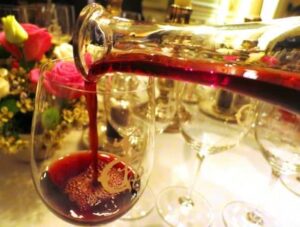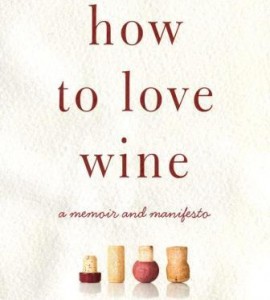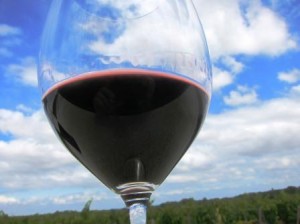
Eric Asimov Interview “How to Love Wine: A Memoir and Manifesto”
Eric Asimov is interesting, opinionated, smart and sure of himself. He maintains quixotic notions about wine and wine appreciation. Like a fine wine, Asimov has depth and complexity. I found him very forward and upfront about his views. Eric Asimov is no shy wallflower. He calls it as he sees it, without regard to how others will take it. It’s a trait he shares with Robert Parker.
His new book, “How to Love Wine: A Memoir and Manifesto” is worth the read. I do not always agree with his opinions. I find some are out of step with how I see wine, wine appreciation and wine criticism. And that’s fine. It’s not important to agree. What is paramount is to discuss, share views and reflect. I agree with his goal of making wine easier to love for people that want to discover its pleasures. Far too many people are turned off from the hobby, because they fear wine is overly complicated. Wine is not supposed to be difficult to comprehend. It’s a beverage of pleasure that at certain times creates memories. “How to Love Wine: A Memoir and Manifesto” will help some readers feel more comfortable about learning how to love wine.
Clearly, “How to Love Wine” is a work of passion. Eric Asimov is definitely passionate about wine and helping others learn to love wine as well. If you do not get that sense, you must be reading a different book. His enthusiasm is infectious enough to entice me to try some of the wines he clearly loves, even though they are not the style of wine I prefer.
Eric Asimov was gracious enough to allow for a frank discussion on a myriad of topics ranging from the wines he’s passionate about, to issues with professional wine critics, including Robert Parker, to what wine he opened last night with dinner. Most importantly, he explained how he learned to love wine and he how wants you to learn to love as well.
Jeff Leve How did you learn to love wine?
Eric Asimov “By drinking lots of it! I came to wine through food. I fell in love with eating, cooking and restaurants as a teenager, and wine always seemed to be part of the ensemble.”
Jeff Leve Is that what inspired to you to write “How to Love Wine: A Memoir and Manifest”?
Eric Asimov “As I wrote in the book, people naturally want to speak to me about wine, and one of the recurring themes was how wine made them feel anxious and inadequate. I wanted to explore why this was so, and midway through my exploration, I thought I would also discuss my own experience falling in love with wine.”
Jeff Leve Were you brought up in a wine family?
Eric Asimov “No, but if I were growing up today, I have no doubt that wine would have been important to our family. My parents were part of the American food revolution. They grew up essentially in immigrant families during the Depression. They prospered after World War II, and were ready to hear what people like Julia Child had to say. When I started to become very interested in wine in the 1980s, my father did, too, and it was something he and I would have very much enjoyed sharing, had he not died relatively young.”
Jeff Leve In the book you mention sharing a special Bordeaux on your parents anniversary, a bottle of 1955 La Mission Haut Brion. Do you like old wines?
Eric Asimov “I love old wines!”
Jeff Leve What other old wines have you really loved?
Eric Asimov “Burgundy, Bordeaux, Barolo, Loire reds and whites, California cabs, German Rieslings Madeira, you name it! I love them more than I can afford them, I’m afraid..”
Jeff Leve Is there one bottle of older wine that really stands out for you?
Eric Asimov ” The most amazing? An 1846 Meursault, still fresh and complex! Most troubling, a 1944 Rheingau, served at the estate. Impossible to enjoy..”
Jeff Leve We both share that love for old wines. In fact, all my most memorable wine tasting experiences have been with fully mature, older wines. Do you think Bordeaux made today will offer the same pleasure after decades of bottle age?
Eric Asimov “I think that the best classically made Bordeaux will continue to age beautifully. I’m not convinced, though, by bottles made from ultra-ripe grapes or by heavily manipulated wines..”
Jeff Leve Why do you think Bordeaux from ultra-ripe grapes does not possess the ability to age well?
Eric Asimov “I don’t think wines that are produced from ultra-ripe grapes, possibly with concentrators and other technology will age as well. Not because I think Bordeaux is more manipulated or ultra-ripe, but because Bordeaux is the benchmark for long-aging red wines. I believe the same is true of Napa Cabernet Sauvignon and other reds.”
Jeff Leve 1990 Bordeaux, as well as 1959 Bordeaux, 1929 and of course 1982 were considered ripe in their day. In their formative years, those wines were deemed lacking in their ability to age and develop. While they are less ripe than wines produced currently, do you think those vintages are aging well?
1982 Bordeaux Wines are aging beautifully. Not so sure once you go beneath the best. But I think there is a different between a ripe vintage like 1982, when techniques were still essentially traditional and vintages where grapes are grown to an ultra-ripe, dimpled state intentionally, and then further concentrated or manipulated. But I will qualify this by saying my experience with vintages like 1929, 1959 and sadly 1947 is limited.
Jeff Leve Do you recall your epiphany wine?
Eric Asimov “I’ve had many epiphany wines! They’ve ranged from a white zinfandel that I had as a college student to rare, well-aged bottles. But if I had to pick out one wine that flipped a switch, it was a 1978 Giacomo Conterno Barbera d’Alba that I drank as a graduate student in the early 1980s. It was so much better than the usual run of cheap wines I had been drinking, and yet it was only $8, that I vowed to find more wines like it that gave me so much pleasure.”
Jeff Leve Are there other special bottles, or moments you recall related to wine that have remained with you?
Eric Asimov “Wine has been part of many special occasions for me with family and dear friends. The bottle of 1955 La Mission Haut Brion which I wrote about, was one such bottle. But I remember the inexpensive bottles that revealed to me the potential pleasures of Burgundy and Mosel Riesling, and the imperial of 1986 Lafite Rothschild, the First Growth Bordeaux that drew friends from across the country for a special dinner. Wine, food, friends and family blend together in a tableau of wonderful memories. That’s the beauty of wine: it transcends the moment and persists over time.”
Jeff Leve In your formative years, what were the wines you first purchased? Do you still buy any of those wines today?
Eric Asimov “My tastes continue to evolve. But my love for Burgundy, Riesling, Piemontese and Sangiovese wines has been pretty consistent. I’ve always loved Champagne. But in terms of personal preferences, I drank a lot of Chateauneuf du Pape in the 1980s and ‘90s, but rarely drink it any more. Honestly, though, I drink and enjoy so many different wines, and so much of what is available today you never saw 25 years ago. This is really the greatest time to be a wine lover.”
Jeff Leve Why do you think it’s a great time to be a wine lover today?
Eric Asimov “We have more fascinating wines from more places in more styles made from more grapes than ever before. American consumers, who may have access to more of these wines than anybody else, can find wines that nobody ever heard of 20 years ago, made at higher levels of quality than ever before. Who imagined 25 years ago being able to go to a wine shop in the US to buy great wines from the Jura, Sicily, Ribeira Sacra, etc, not to mention all the New World regions that were struggling back then. Many classic regions are producing at a higher level of quality than ever: Champagne? Burgundy? Germany? Sicily?”
Jeff Leve You left out Cote Rotie, a wine I am sure you would really enjoy. Do you like that style of Northern Rhone?
Eric Asimov “I love Cote Rotie. But I prefer the old-school style, which is not easy to find anymore!
Jeff Leve I agree with you 100%! This is a great time for wine lovers. With that thought, what bottle did you open recently?
Eric Asimov “Last night I drank a really nice 2011 Valpolicella Classico SaSeTi from Monte Dall’Ora, fresh, vibrant, direct, not plumped up like the Ripasso wines. I love this style of Valpolicella.”
Jeff Leve Over the years, how has your taste and wine appreciation evolved?
Eric Asimov “I think I’ve grown to appreciate more subtle wines over the years. I’m no longer interested so much in wines that shout at me. I prefer a quieter conversation. I also find myself drawn far more to what I call ensemble wines, wines that enhance the dining experience without insistently demanding the spotlight.”
Jeff Leve Do you consider wine or food first when making dinner?
Eric Asimov “Both and neither. Depends on my mood and company. I don’t think of myself as dogmatic or doctrinaire. In restaurants, I do tend to look at the wine list first. I like to see what’s good on the list, and then figure out what to eat with it.”
Jeff Leve What is a quality wine?
Eric Asimov “Not to be pedantic about it, but quality is a misused word, like “ethnic.’’ Just as we all have ethnicity, all wines have quality. Some good, some bad and many in between. I know what you’re getting at though. I guess the most succinct answer I could give is, a wine that holds your interest.”
Jeff Leve In your book, “How to Love Wine: A Memoir and Manifesto” you discuss the best way to taste a wine is to get to know it. Can you elaborate?
Eric Asimov “What I mean is that, with good wines, tasting is no substitute for drinking. And the better the wine, the more you need to drink it over time – when it’s young, middle-aged and old, and in between. This is how you get to know a wine best. When we look for shortcuts, we fool ourselves.”
Jeff Leve Why are some people afraid of wine?
Eric Asimov “This is truly a complicated question, and in large part a subject of my book. I think wine is still largely unfamiliar to many people. And consumer experiences are so different from their expectations, at least as shaped by the experts. When their own experiences don’t conform to what they are led to believe they ought to be, they blame their own inadequacies.”
Jeff Leve Do you think the American wine consumer has a different approach to wine than European consumers?
Eric Asimov “They have in the past.”
Jeff Leve Why?
Eric Asimov “I think because we for the most part did not have a wine culture, we relied on experts to tell us what to drink and teach us what to think. So paradoxically, for a time wine lovers in the USA knew a lot more about wine than Europeans, although Europeans were not nearly so uptight about it. Now, Europeans are drinking less wine and have learned to approach wine more like Americans. So I would say there is a coming together.”
Jeff Leve You mentioned the effect of expert opinions on consumers, which I agree with, especially for people new to wine appreciation. But we differ on the value of tasting notes. Why don’t you like wine tasting notes for consumers?
Eric Asimov “I don’t think wine tasting notes, at least as they’re so often written, as lists of aromas and flavors, tell us anything important about the wine. I think wine descriptions would be far more helpful if they spoke generally about style and structure.”
Jeff Leve If wine tasting notes do not help guide consumers with helpful hints on purchasing wines, what is a better method?
Eric Asimov “Consumers don’t pay attention to tasting notes in general anyway. They largely follow scores, until they outgrow scores and notes and develop their own tastes. For these more advanced wine drinkers, scores are primarily important if they are wine investors.”
Jeff Leve Taking that a bit further, what is your view on scoring wines?
Eric Asimov “I think scores present a false certainty, at least when we are talking about good wines. They presume that one can apply a Consumer Reports type of objectivity to a living, evolving, subjective beverage. Personally, I think when you do become serious about wine, you are less concerned about individual bottles and become more interested in producers and styles, and how those wines change over time.”
Jeff Leve But aren’t some wines clearly better than others in the same peer group? If so, doesn’t a score simply represent an easy way to inform consumers that in the writer’s opinion, one wine offers better value over another wine?
Eric Asimov “I don’t think scores communicate to consumers what scorers imagine. Many consumers apply scores indiscriminately across genres. Meanwhile, scores are the product of quick mass tastings and are not always accurate.”
Jeff Leve Do you feel the same about tasting notes written by amateurs as professionals?
Eric Asimov “I don’t really care who is writing the note. It simply is irrelevant to me whether you tastes berries, cherries, fig paste or pain grillé in the wine. If you want to tell me it’s oaky, cloying or tannic, that might be more helpful.”
Jeff Leve What would you like to see consumers read instead of tasting notes?
Eric Asimov “I divide consumers into two major groups. The first comprises casual wine drinkers, the sort who simply want to know which bottle to pick up on the way home or to a party. These people don’t really care much about wine; they just want not to make a mistake. They want something decent and palatable, something they will like, and if scores and tasting notes give them greater confidence about their purchases, fine. The second group is more seriously interested in wine. I suggest to them books that put wine into a cultural context, social histories, cultural histories, biographies, wine atlases, even memoirs in which wine plays an important role. Then, if they are sufficiently interested to pursue technical details, that is the time for wine texts. I hate the notion that the way to learn about wine is to memorize a bunch of technical details.”
Jeff Leve You mention cultural context and history. Why does history and context matter to wine?
Eric Asimov “Good wine is an expression of a people, of a place, of a culture, and the more you understand about the culture, the more you understand the wonder of the wine. To isolate wine, the beverage, from wine the cultural expression is, I think, one of the bigger drawbacks of the score-and-note system.”
Jeff Leve While Robert Parker did not invent the tasting note, it perhaps dates back to the 1600’s, certainly the most widely read and influential writer of tasting notes is Robert Parker. Has he been helpful or harmful to wine and consumers?
Eric Asimov “I think simply by virtue of his enthusiasm and the profound pleasure he has found in wine, Robert Parker has done a tremendous amount to kindle interest in wine among Americans. I’m certainly among those people who, as a beginning wine drinker, found Robert Parker to be an inspiration. I think that will be his legacy. But I don’t think he has done himself any favors or burnished his legacy with his peevishness and intolerance over the last 10 or 15 years.”
Jeff Leve Over the years, what trends in wine have you found to be positive?
Eric Asimov “I think we have come a long way toward appreciating that many different styles of wine are appealing, and that people can have many different tastes. This is a direct result, I think, of the high-speed Internet age, which has helped to de-centralize wine authority. In other words, we have so many more voices and opinions to weigh. And, in contrast to those who peddle the notion of thousands of groundless opinions flailing about the airways. I think the Internet is quite the Darwinian environment. It quickly weeds out those who have something worth hearing from those who have nothing worth saying.”
Jeff Leve Putting the shoe on the other foot, what trends have you found negative?
Eric Asimov “I find the continuing wine culture wars to be oppressive. I think the trend of increased corporate ownership will always be a threat to diversity. I’m alarmed by small family estates that evaporate because generational transition proves impossible. I think it’s terribly sad that young wine enthusiasts for the most part can’t afford what have historically been the benchmark wines. But for the most part I’m more optimistic than pessimistic.”
Jeff Leve What can people learn from reading “How to Love Wine”?
Eric Asimov “I hope that “How to Love Wine “will give people another way to think about wine. The conventional wisdom is very powerful. I have no illusions about overturning what has been a lucrative system for most concerned. I think consumers will benefit by thinking of wine in a different way, as an expression of culture, as I said earlier, rather than as another product like a toaster or car that can be measured and rated. And, most important, I hope readers will feel more relaxed about wine, have more of a sense of ease and wonder about it, after reading the book.”
Jeff Leve Would you consider yourself a wine writer, wine critic or both?
Eric Asimov “I’m a wine critic. I wear the title because it indicates that wine is in its own, an expression of culture that deserves critical attention, just as we have a movie, theater, book, restaurant, art, etc. critics. If people outside the New York Times want to debate whether I’m a writer, critic or both, fine. To me it’s a waste of time.”
Jeff Leve Is there another wine book in your future already in the planning stages?
Eric Asimov “Absolutely! Not going to give it away yet, though.”






22 Comments
Eric Asimov Interview How he Learned to Love Wine http://t.co/RmN4YrT4IT via @jeffLeve
Thank you for article Jeff. It’s always interesting to learn what the professionals think about wine and how they approach wine appreciation. Is it passion or a job I often wonder. Keep up the good work. I’d like to see more interviews.
Eric Asimov “I don’t think wine tasting notes written as lists of aromas & flavors tell us anything important” | WCI http://t.co/b95UOwZ3t1
Consumers should think of wine “as an expression of culture” rather measuring & rating like a toaster” | WCI http://t.co/b95UOwZ3t1
.@Topwinenews Thank you for the mention of the Eruc Asimov interview! More to come. http://t.co/2uLwnqdejP
.@terroiristblog .@EricAsimov Thank you for the RT David. Eric Asimov has a lot to say, he’s not afraid to say it! http://t.co/2uLwnqdejP
RT @JulioArmas: Interview: Eric Asimov and How he Learned to Love Wine http://t.co/MjRHlteTzJ vía @JeffLeve
RT @RosehillWCellar: “Eric Asimov is definitely passionate about wine and helping others learn to love wine as well.” http://t.co/QDvOdpmmQv #wine #interview
RT @Nachete67: @EricAsimov Interview How he Learned to Love Wine #wine
http://t.co/XzN1rlV1IY
I agree with Asimov’s philosophy http://t.co/MIQEJoy6S7
#WineTalk: Eric Asimov Interview How he Learned to Love Wine http://t.co/3kxsvTFi06
A must read if you love wine: http://t.co/IRz3XN5dIP
RT .@EricAsimov: A very nice Q & A about “How to Love Wine.” Thanks, @JeffLeve http://t.co/tCoYPNov1P
RT @EricAsimov: A very nice Q & A about “How to Love Wine.” Thanks, Jeff Leve. http://t.co/RxeRdXsMe5
@EricAsimov Interview How he Learned to Love Wine | The Wine Cellar – Jeff Leve | vía @JeffLeve | http://t.co/DqYIdSxr8s
RT @EricAsimov: A very nice Q & A about “How to Love Wine.” Thanks, Jeff Leve. http://t.co/RxeRdXsMe5
#EricAsimov A great read for wine drinkers: http://t.co/rdJni3Nav7
RT @maccocktail: “@EricAsimov Interview How he Learned to Love Wine” http://t.co/lHgk28hkmI
RT @DailyWineNews: Eric Asimov Interview How he Learned to Love Wine:
Eric Asimov Interview How he Learned to Lo… http://t.co/CoCL8gKWvp (via @jeffleve)
Jeff, thanks for this great in-depth interview. I am very interested in adding his book to my collection now. I concur with many of his beliefs, especially the ones that encourage people to enjoy wine without intimidation. Excellent job.
Thank you for the nice words Alana! It is much appreciated. Come visit more often…